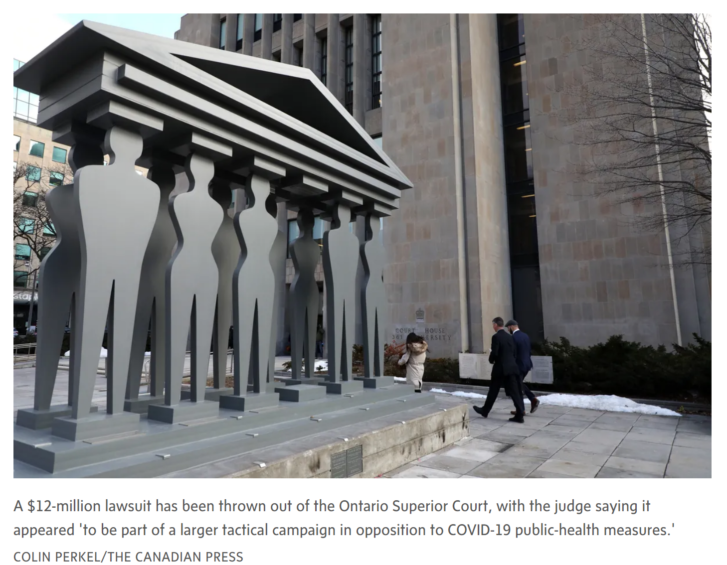A judge has thrown out a $12-million defamation lawsuit against more than 20 journalists, medical doctors and media outlets, saying it was intended to silence legitimate debate about the COVID-19 pandemic.
Two Ontario medical doctors, Kulvinder Gill and Ashvinder Lamba, sued over comments published mostly on social media that accused them of spreading misinformation about COVID-19. The two doctors have more than 80,000 followers on Twitter between them, and thousands more on Facebook.

Dr. Gill had tweeted in the summer of 2020, “we don’t need a vaccine,” and suggested COVID-19 risks were exaggerated, lockdowns illogical and the discredited hydroxychloroquine an effective treatment. The lawsuit accused some of the doctors who took issue with Dr. Gill of conspiring against her “like a gang of hyenas.” (Dr. Lamba joined only part of the lawsuit, accusing two doctors of defamation.)
Under a 2015 Ontario law shielding participants in public debate from expensive legal actions designed to intimidate and silence them, a court can quash a defamation suit if the comments complained of were on a topic of public interest. The law is known as anti-SLAPP, for creating a way to counter strategic lawsuits against public participation.
Ontario Superior Court Justice Elizabeth Stewart said in a ruling last week that the defamation claims in the doctors’ lawsuit are “precisely” of the kind that the anti-SLAPP law is “designed to encourage and screen out.” The judge also said that the allegations in the lawsuit “appear to be part of a larger tactical campaign in opposition to COVID-19 public-health measures,” and to silence contrary views. She did not elaborate.
The first step for those asking a judge to throw out a defamation lawsuit under the anti-SLAPP approach is to show that the subject matter is in the public interest. Justice Stewart said nothing could be more important than discussing COVID-19. “No issue falls more squarely into the definition of a matter of public interest than a global pandemic,” she wrote.
The next step is for those accusing others of defamation to show that the defendants have no legal defence they can claim, that the defamation suit has a real prospect of success, and finally that the harm done to an individual’s reputation outweighs any benefits from the discussion. On all these grounds, Justice Stewart said, Dr. Gill and Dr. Lamba failed.
Several defences were available, such as fair comment (an opinion, not expressed out of malice) and qualified privilege (a protection claimed by medical doctors who said they had an obligation to promote science-based responses to the pandemic). In any event, Justice Stewart expressed doubt that many of the comments were defamatory, or damaging, at all, and said any harm might have been “self-inflicted.”
“If this proceeding were allowed to continue, its chilling effects would have an impact well beyond the parties to this case,” she wrote. “There is a real risk that the effects of this proceeding will stifle the speech of the defendants, and deter other physicians, journalists, scientists, and other members of the public from engaging in public discussion and discourse about potential misinformation on matters of public health in the future.”
Lawyer Rocco Galati, who represented Dr. Gill and Dr. Lamba, said Sunday that it was not his clients who tried to shut down debate. “The defamation was an attempt to stifle public discussion of an important issue.” Attempts to reach Dr. Gill and Dr. Lamba directly were unsuccessful.
The lesson of the case, said Julian Porter, a lawyer for Nadia Alam, one of the doctors accused of defamation, is that if you make provocative comments in the public arena, “you’ve asked to have a bloody nose.”
John Van Aerde, a retired pediatric specialist in British Columbia who has published more than 100 peer-reviewed papers, said he was shocked to be sued for COVID-related comments, “when you live in a country where people are screaming and shouting about freedom, and freedom of speech, and when the voice of science and reason is being silenced.”
The Globe and Mail’s health columnist, André Picard, was among those sued for challenging Dr. Gill’s published views on the pandemic. Mr. Picard had tweeted that he was shocked a medical doctor would publish information so contrary to the consensus among public-health officials and the scientific community. In an ensuing Twitter storm, several of those who expressed support on social media for Mr. Picard – including medical doctors, Globe reporter Carly Weeks and Toronto Star columnist Bruce Arthur – were also accused of defaming Dr. Gill.
“The ruling is welcome because calling out misinformation is an essential element of good journalism and sound public-health communication,” Mr. Picard said Sunday. “No one should be bullied into silence.”
Ms. Weeks was sued over a single tweet that said Mr. Picard “doesn’t hesitate to call out BS when he sees it.” Physician Abdu Sharkawy was sued over a tweet that said Ontario doctors are concerned about the spread of “very dangerous misinformation that will cost lives.”
Dr. Lamba joined with Dr. Gill in suing a medical doctor who had used crude language in criticizing them online, and a former president of the Ontario Medical Association for her response to a complaint about the crude language. Like the other complaints, they were dismissed by Justice Stewart.
Article From: Globe and Mail
Author: JUSTICE WRITER

